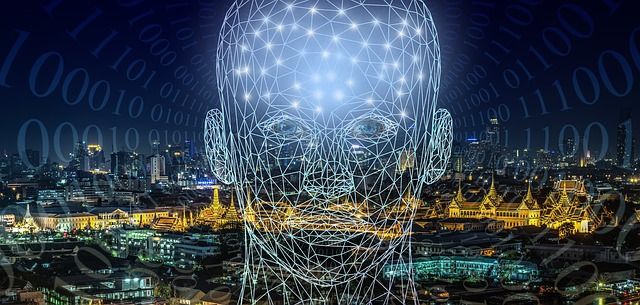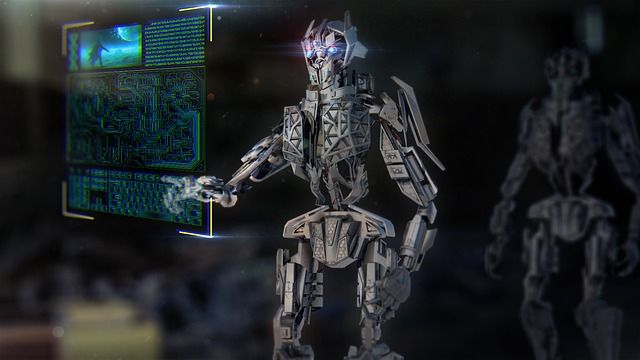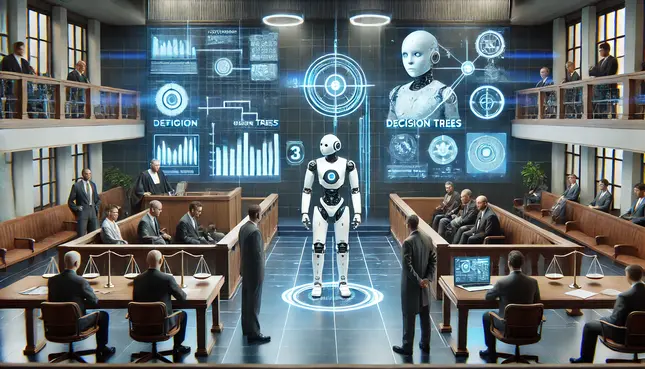Ethics of AI: All You Need to Know
The AI ethics scenario is based on a set of moral procedures and principles that are intended to guide the development and responsible application of artificial intelligence. The ethical implications of AI system is highlighted as a vital aspect of services and products in a variety of disciplines.

Given the historical perspective of AI, 1949 has served as the rising star of the computer era. The advent of the computer age initiates with the warning of French philosopher Gabriel Marcel. He acclaims that the implementation of technology with ingenious approaches for resolving life's problems are digging futilitarian efforts. The philosophical domain of Marcel has diversified his visions regarding life. Therefore, in his book named Being and heaven, he extracted that fixation of life is not parallel to the amendment of vehicle car. Any technique or approach employed to fix that solution is the component of the same troublesome world. Hence, the fixation or solving strategy is itself compromised and dubious. Marcel’s recommendation crafts in a single memorable phrase known as: "Life is not a problem to solve, but a mystery to lived." Well, this warning goes useless as the birth of artificial intelligence after seventy years depicts as one of the most robust embodiments of human's desire to modify human life with computers. The question which arises here is that for what purpose are these computers are and what can they do for the human generation? And is AI good or bad?
According to Marcel, the intriguing factor also elevates questions like whether these machines can resolve humans' troublesome lives.
DEFINING ETHICS IN AI/ INTRO TO ETHICS
The scenario of AI ethics originates from the system of moral techniques and principles determined for informing the development and responsible employment of artificial intelligence. The result of AI codes ethics has revealed as an integral part of services and products in various fields of life.
The other defining term for AI ethics is Artificial intelligence value platform; it is a statement of policies that elaborates the participation of AI in the development of human generations. This target code of ethics aims to furnish the stakeholders with proper guidance regarding the use of artificial intelligence. The most renowned science fiction writer, Isaac Asimov, had predicted the potential harms of autonomous AI agents long before their creation and development. Well, the three rules of Robotics have served as the possible source in limiting the risks of AI agents. Asimov's three laws of robotics have served as the turning point of AI. The first law revolves around the forbidden policy that robots should not harm the human race or impose any danger to humans who refuse their act. The extract of the second law runs parallel with the first law unless it orders the robots to follow human direction. The criteria of these laws have coherence with the first law. The third law of robotics compels the robots to protect themselves while keeping following the first law.

The outstanding advancement in AI in the past five years has influenced the troops of AI experts to develop safety lines against AI risks. There is much non-profit organization working to create the AI principles.
BRANCHES OF AI ETHICS
The vast-ranging branch of philosophy has given birth to the field of ethics. This field has a stalwart connection with grounded beliefs, policies, and decisions. Ethics depicts as the classic example for resolving the questions related to human rectitude. The deriving power of some moral systems has furnished significance to various actions and beliefs. The areas of ethic intelligence which require scrutiny have been divided into the following subcategories:
1. Normative ethics
It is about the act of people towards robotics sciences that how they should act towards AI.
2. Applied ethics
This field talks about the worthy or correct things—the weightage of valuable items or moral activities and their application in AI. The criteria of this field also deal with money, morality, and machine automation.
3. Meta-ethics
The differentiation between good and evil, what these concepts do have been discussed in the field of meta-ethics. Meta-ethics makes these concepts crystal clear.
THE SIGNIFICANCE OF AI ETHICS
Nature has inculcated a moral compass in the composition of human beings, which allows them to differentiate between right and wrong. Whenever humans encounter something which doesn't suit their moral values, this compass triggers their brain, and they feel that something is wrong. The construction of this moral compass directly relates to the environment and upbringing phases of an individual's life. It is a protocol on which global digital ethical issues have been treated, and AI companies are working on ethics and compliance.
However, artificial intelligence has wholly deprived of this so-called moral compass. The capacity of AI technology has only built up to tagged data. It means that the data labeled as right and wrong will only be differentiated by AI technology. The criteria of AI are far away from the basis of ethics known as empathy and awareness. The relation of moral compass and AI originates from its manufacturers' domains, which decide what is right and wrong for the AI gadget.
The technology produced by a human to imitate, augment, and replace human intelligence is termed AI ethics. The dependency of these AI tools is on a wide variety of data sets that develop the insight. The AI projects which are poorly designed have biased or inadequate data sets and can have features of potentially harmful, undifferentiated consequences. Furthermore, the achievement in concluding AI is related to swift development in the algorithmic system; AI has coherence driven by AI systems that can play a role in influencing society.

The benefits and risks of AI have flickered under the umbrella of AI ethics. The framework of AI ethics has significance with the purpose of responsible use of AI in this era. The other side of responsible use of AI ethics revolves around the industry and interested parties that will focus on major social issues. The ultimate extract of AI ethics is unique moral techniques and tenets for achieving AI technology.
ETHICAL CHALLENGES FOR AI:
The ethics of AI faces the following challenges, which will leave evident impacts on AI technology.
- Responsibility
The AI systems have diverse responsibilities in society with everlasting impacts. The community members contributing to sorting out the duties of the AI system are still facing a dilemma when they look at the catastrophic effects of AI systems. For instance, loss of human life and health deprivation are some warning situations? It requires particular scrutiny from society in figuring out the evil impacts of AI. The settlement of responsibility regarding the destructive results of the AI system demands a proper procedure that incorporates regulators, lawyers, and citizens. One of the most highlighted challenges in finding the correct system where AI system will provide safer zones than human activity is replicating human intelligence perfectly. For example, People like doctors can also cause fatality, and AI-oriented gadgets have replaced various laboratory processes, but still, there are some flaws in constructing AI systems. - Misemployment
There may be the employment of AI algorithms for objectives other than those for which they have manufactured. A deep penetrated analysis of all possible scenarios needs performance at the designing stage of the AI system. It will minimize the risks and furnish safety measures to reduce the harmful impacts in every possible case. The artificial intelligence conclusion opens tremendous ways to unlock the solutions for the misemployment of AI. - Equality
The AI data sets which have systems to install personally identifiable information should respond with the assurance of no bias policy. It means that the programming of the AI system should treat everyone without any distinction of color, creed, race, class, gender, ethnicity, and nationality. The quality of AI ethics adorned with the morally opaque trait will assist in paving the way towards equality among individuals. - Surveillance system
When there is a misalignment in the AI system, the manufacturing team should have the skills to check through the Algorithmic system and resolve the problem completely. The detection of harmful factors for AI teams plays a crucial role and demands proper traceability of source data, trace data, and AI algorithms.
ADVANTAGES OF ETHICAL AI
The exponential development in AI technology has resulted in the grounded amalgamation of AI with progressing businesses. Well, this coincidence has resulted in two dominant factors:
- Elevation in social activism.
- The maximal rise in customer-centricity.
It's an acceptable reality that the rewards of businesses revolve around the provision of top-quality products and services and for validating the customer's values and posing good impacts on societies. The AI companies strive to provide potential solutions towards AI threats to privacy that breaches cybercrime and many other issues.

The contribution of AI in brand recognition by the customers and developing their beliefs is crystal clear. However, responsible use of AI technology is necessary for constructing positive consequences. The other crucial component of businesses is employees, and it's the responsibility of companies and AI technology to hold their information to make them feel satisfied and good. Responsible employment of AI will run a long way with high talent retention and smooth company operation.
WHAT DOES THE AI CODE OF ETHICS MEAN?
It's important to know that how AI experts elaborate/define the AI code of ethics?
The AI code of ethics has surrounded by three main areas that ensure the proactive approach of ethical AI.
Orientation of policymaking
The construction of a proper outline regarding the AI system for establishing the regulations and driving uniformity in AI ethics are significant. There are noticeable efforts in this domain, like AI principles presented by Asilomar. Other than this, many other contributions are revolving around the USA and Europe. The AI policies addressing ethics should have complete access to tackle legal issues on encountering the wrong act. The AI companies may also spread ethical values by incorporating AI ethics in their code of conduct. However, it has a complete connection with employees' response towards the adaptability of these target codes of ethics.
Awareness about the policy
The AI companies' data scientists, executives, and front-line employees must thoroughly understand the AI policies, potentially harmful effects of unethical AI, and fraudulent data services. In addition to this, another challenge that requires attention is the convenience of sharing the data or AI automation. It will pose severe destructive impacts due to oversharing and inauspicious automation. It is complex as it is the amalgamation of perception, value, and risk, instantly available.
Technology for safety
The architectural domain of AI systems must embellish with unique features that detect any unethical behavior and counterfeit data. The achievements of these features are possible by a two-way approach. One is by deeply exploring and researching the AI system owned by the manufacturing company to prevent any unethical activity. The second one is to carefully observe the partners and suppliers for the company to avoid any pernicious use of AI. For instance, it is disabling the fake text and videos to excavate the competitor or the employment of AI for introducing a well-planned cyber-attack. The problem becomes more severe when AI tools become commercialize. To minimize the effect of this problem, AI companies must invest in defensive strategies, which have deep penetration into trusted and transparent AI architectural designs. It will allow the endorsement of trust fabrics to introduce the system-level approach to ensure data confidence, automated privacy assurance, and investigate the unethical use of AI.

IMPORTANT EXAMPLES OF AI CODES OF ETHICS
The orientation of AI codes of ethics has revolved around the principles that furnish the proper motivation that operates appropriate behavior. A standardized machine learning ethics which are necessary to teach in the policy of AI Company have mentioned below:
- The AI system must have architectural designs exclusively with no biased strategy. The system must entertain its consumers equally, keeping the ethical grounds intact. It will be possible when there is complete knowledge about the origin of each data set transferred for training the AI models. It is the ultimate way to ensure no inherent unfairness is installed in the AI data set. Close monitoring of AI models is also necessary to assure that there will be no possibility of corruption shortly. The confirmation of fair policy is also possible by inspecting the trained model cautiously to sieve any troublesome factors in the AI process.
- Another feature of ethical AI is that it must process the data responsibly with positive objectives towards society and the consumers.
- A sound, explainable AI system is also a helpful factor in the execution required for AI companies to guarantee the ethical use of AI. It is a bit difficult to gather the confidence in elaborating the actions of AI systems that are unexplainable. The way of faith can lead to exploring new AI algorithms that will have complete explain ability of model performance.
- The sole purpose of ethical AI is to benefit humans and imparts positive vibes towards society. The objectives of the technology code of ethics are to make the system free from fraudulent activity, eradicate waste information, decelerate the climatic changes, and assist in curing diseases. Anyone can divert the technology for nasty tasks, but AI ethics has intended to make the AI world free from evil purposes.
THE FUTURE PERSPECTIVES OF ETHICAL AI:
There are some queries regarding the AI code of ethics, and some AI experts claim that it requires a more powerful initiative for complete evolution. Some AI professionals reveal that the significant issue of the AI code of ethics lies in its nature, that whether it is reactive rather than proactive. While our AI field workers mainly focus on the biasing effects of ethics in AI and strive to eliminate it. The criteria of the reactive approach can have issues when dealing with data set embedded in bias. For instance, if we talk about gender bias, and historically women haven't received loans at an exponential rate, then it will get entangled into AI data in multiple ways.
The future perspectives of ethical AI must rely on improving social norms and normalizing fairness among the consumers. For example, at the bank's loan department, the AI team and managerial staff will collectively decide whether they have an intention for equal consideration of loans or not. The loan will process for all the races equally, and the calibrated results will have relativity for each race. The focusing point of AI technology should revolve around the guiding principles rather than avoiding the rule.
FINAL DISCUSSION
After having a detailed discussion about ethical AI, it is concluded that ethical and responsible AI is the only relieving factor for human generations. The turning of individuals towards the technologies and rules that will promote the responsible use of AI is the ultimate way. It will encompass the programming of services, products, and offers that will protect human interests and be free from any biasing strategy. The particular procedure will target any specific group of people, including minorities, special needs, or poor localities. These aspects are crucial as AI can trigger the economic and social warfare between people with the capacity to utilize the technology and those who can't.


